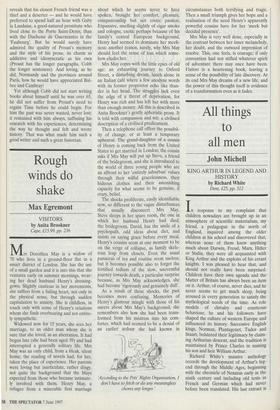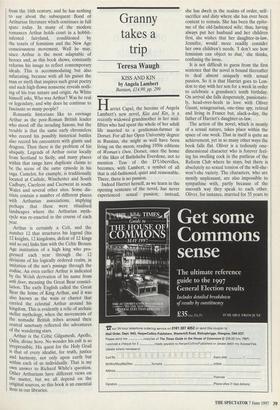All things to all men
John Michell
KING ARTHUR IN LEGEND AND HISTORY by Richard White Dent, £25, pp. 512 In response to my complaint that children nowadays are brought up in an atmosphere of scientific materialism, my friend, a pedagogue in the north of England, inquired among the older children at his school and discovered that, whereas none of them knew anything much about Darwin, Freud, Marx, Hitler or Stalin, they were all acquainted with King Arthur and the exploits of his errant knights. I was pleased to hear that, and should not really have been surprised. Children have their own agenda and the Matter of Britain has always been an item on it. Arthur, of course, never dies, and he never seems to get much sleep, being aroused in every generation to satisfy the mythological needs of the time. As role models of chivalry and courteous behaviour, he and his followers have shaped the culture of western Europe and influenced its history. Successive English kings, Norman, Plantagenet, Tudor and Stuart, bolstered their legitimacy by claim- ing Arthurian descent, and the tradition is maintained by Prince Charles in naming his son and heir William Arthur.
Richard White's massive anthology records the development of Arthur's leg- end through the Middle Ages, beginning with the chronicle of Nennius early in the ninth century and including old texts in French and German which had never before been translated. His last extract is from the 16th century, and he has nothing to say about the subsequent flood of Arthurian literature which continues in full spate today. In many of the modern romances Arthur holds court in a hobbit- infested fairyland, conditioned by the tenets of feminism and the New Age consciousness movement. Well he may, since Arthur is the most adaptable of heroes and, as this book shows, constantly reforms his image to reflect contemporary ideals. This is accommodating but also infuriating, because with all his guises the man or myth that inspires such great poetry and such high-flown nonsense reveals noth- ing of his true nature and origin. As White himself asks, Who was Arthur? Was he real or legendary, and why does he continue to fascinate so many people?
Romantic historians like to envisage Arthur as the post-Roman British leader who stood off the invading Saxons, but the trouble is that the same early chroniclers who record his possibly historical battles also record his encounters with giants and dragons. Then there is the problem of his ubiquity. Legends of Arthur occur locally from Scotland to Sicily, and many places Within that range have duplicate claims to be the scene of the same episode in his saga. Camelot, for example, is traditionally located at Carlisle, Winchester and South Cadbury, Caerleon and Caerwent in south Wales and several other sites. Some dis- tricts contain a number of different places With Arthurian associations, implying perhaps that these were ritualised landscapes where the Arthurian myth- cycle was re-enacted in the course of each year.
Arthur is certainly a Celt, and the number 12 that structures his legend (his 12 knights, 12 kingdoms, defeat of 12 kings and so on) links him with the Celtic Bronze Age institution of a high king who pro- gressed each year through the 12 divisions of his logically ordered realm, in imitation of the sun's passage through the zodiac. An even earlier Arthur is indicated by the Welsh derivation of his name from arth fawr, meaning the Great Bear constel- lation. The early English called the Great Bear the hOme of King Arthur, and it was also known as the wain or chariot that carried the celestial Arthur around his kingdom. This is evidently a relic of archaic stellar mythology, when the movements of the nomadic British tribes around their central sanctuary reflected the adventures of the wandering stars. Arthur is the Celtic Gilgamesh, Apollo, Odin, divine hero. No wonder his cult is so irrepressible. His quest for the Holy Grail is that of every idealist, for truth, justice and harmony, not only upon earth but Within each of us individually. That is my own answer to Richard White's question. Other Arthurians have different views on the matter, but we all depend on the 9riginal sources, so this book is an essential item in our libraries.











































































 Previous page
Previous page